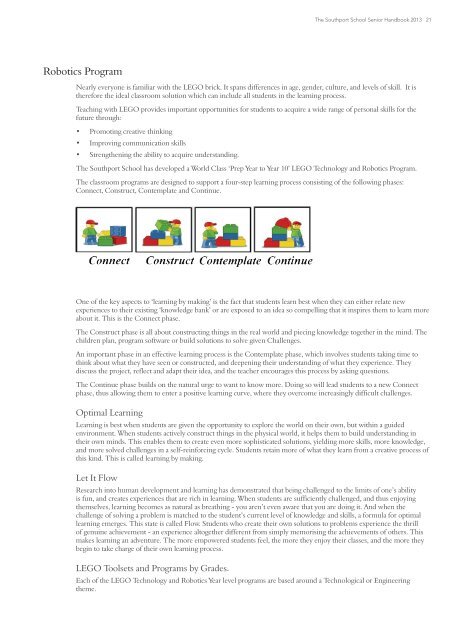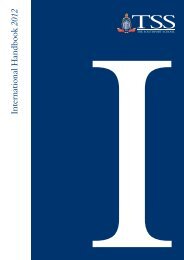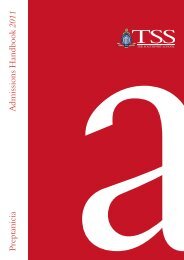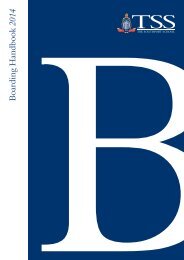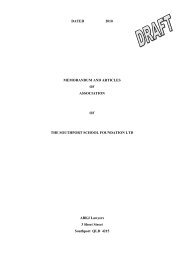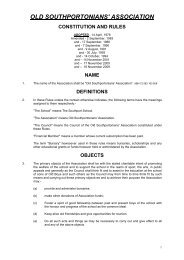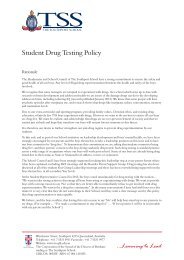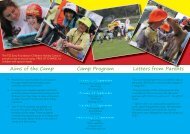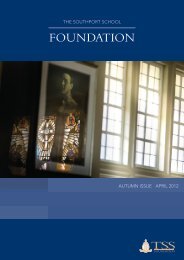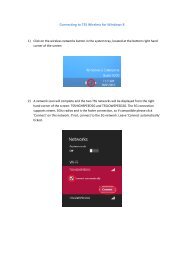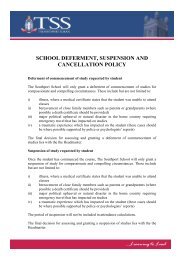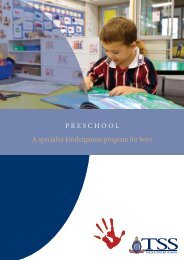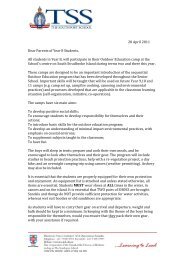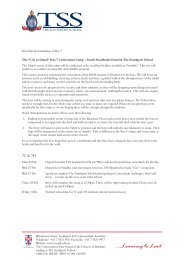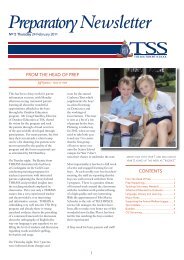2013 Senior Admissions Handbook - The Southport School
2013 Senior Admissions Handbook - The Southport School
2013 Senior Admissions Handbook - The Southport School
You also want an ePaper? Increase the reach of your titles
YUMPU automatically turns print PDFs into web optimized ePapers that Google loves.
<strong>The</strong> <strong>Southport</strong> <strong>School</strong> <strong>Senior</strong> <strong>Handbook</strong> <strong>2013</strong> 21<br />
Robotics Program<br />
Nearly everyone is familiar with the LEGO brick. It spans differences in age, gender, culture, and levels of skill. It is<br />
therefore the ideal classroom solution which can include all students in the learning process.<br />
Teaching with LEGO provides important opportunities for students to acquire a wide range of personal skills for the<br />
future through:<br />
• Promoting creative thinking<br />
• Improving communication skills<br />
• Strengthening the ability to acquire understanding.<br />
<strong>The</strong> <strong>Southport</strong> <strong>School</strong> has developed a World Class ‘Prep Year to Year 10’ LEGO Technology and Robotics Program.<br />
<strong>The</strong> classroom programs are designed to support a four-step learning process consisting of the following phases:<br />
Connect, Construct, Contemplate and Continue.<br />
One of the key aspects to ‘learning by making’ is the fact that students learn best when they can either relate new<br />
experiences to their existing ‘knowledge bank’ or are exposed to an idea so compelling that it inspires them to learn more<br />
about it. This is the Connect phase.<br />
<strong>The</strong> Construct phase is all about constructing things in the real world and piecing knowledge together in the mind. <strong>The</strong><br />
children plan, program software or build solutions to solve given Challenges.<br />
An important phase in an effective learning process is the Contemplate phase, which involves students taking time to<br />
think about what they have seen or constructed, and deepening their understanding of what they experience. <strong>The</strong>y<br />
discuss the project, reflect and adapt their idea, and the teacher encourages this process by asking questions.<br />
<strong>The</strong> Continue phase builds on the natural urge to want to know more. Doing so will lead students to a new Connect<br />
phase, thus allowing them to enter a positive learning curve, where they overcome increasingly difficult challenges.<br />
Optimal Learning<br />
Learning is best when students are given the opportunity to explore the world on their own, but within a guided<br />
environment. When students actively construct things in the physical world, it helps them to build understanding in<br />
their own minds. This enables them to create even more sophisticated solutions, yielding more skills, more knowledge,<br />
and more solved challenges in a self-reinforcing cycle. Students retain more of what they learn from a creative process of<br />
this kind. This is called learning by making.<br />
Let It Flow<br />
Research into human development and learning has demonstrated that being challenged to the limits of one’s ability<br />
is fun, and creates experiences that are rich in learning. When students are sufficiently challenged, and thus enjoying<br />
themselves, learning becomes as natural as breathing - you aren’t even aware that you are doing it. And when the<br />
challenge of solving a problem is matched to the student’s current level of knowledge and skills, a formula for optimal<br />
learning emerges. This state is called Flow. Students who create their own solutions to problems experience the thrill<br />
of genuine achievement - an experience altogether different from simply memorising the achievements of others. This<br />
makes learning an adventure. <strong>The</strong> more empowered students feel, the more they enjoy their classes, and the more they<br />
begin to take charge of their own learning process.<br />
LEGO Toolsets and Programs by Grades.<br />
Each of the LEGO Technology and Robotics Year level programs are based around a Technological or Engineering<br />
theme.


